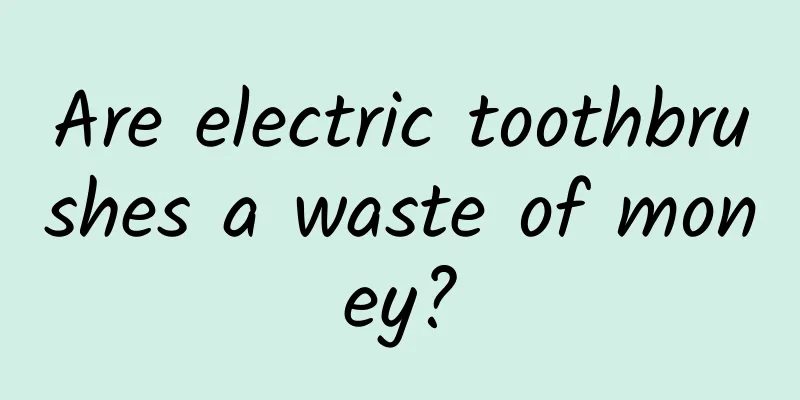Are electric toothbrushes a waste of money?

|
Recently, I saw a netizen saying that he has to have his teeth cleaned every year because of periodontitis. Once when I was having my teeth cleaned at a dental clinic, I asked the dentist if an electric toothbrush is good for periodontitis. The doctor said that electric toothbrushes are only good for hands. Later, when I was filling a cavity at a dental clinic, I asked the doctor if an electric toothbrush is good for brushing teeth. The doctor said it is best not to use it because the vibration amplitude is too large and it will damage the tooth enamel. So why don’t dentists recommend electric toothbrushes? Are electric toothbrushes really a waste of money? Let’s talk about this today! 01. Why don’t dentists recommend electric toothbrushes? The reason why some dentists do not recommend the use of electric toothbrushes is that there are two main problems that need to be solved: the uneven levels of electric toothbrushes and the requirements for electric toothbrush methods. If these two cannot be guaranteed, the risks posed by electric toothbrushes may be greater than those of ordinary toothbrushes. This is why some dentists do not recommend the use of electric toothbrushes. The current electric toothbrush market is very confusing. Many people think that an electric toothbrush is just a toothbrush with a motor. This can be seen from the price of electric toothbrushes. The expensive ones cost hundreds or thousands of yuan, while the cheap ones can even be 9.9 yuan with free shipping. There are big brands, but there are also many products that you have never heard of or even cannot find information about online. This leads to uneven quality of electric toothbrushes. Some people even buy them just for fun. The chance of making a mistake will be greatly increased, and they may even end up buying industrial waste. Therefore, when buying an electric toothbrush, you must be very selective. Even if you choose a good electric toothbrush, many people still cannot guarantee the effect of brushing their teeth. The main reason is that the difference in the execution of brushing teeth is too great. Although many people have heard of or even learned the Bass brushing method, it is much more difficult to use the Bass brushing method correctly. Moreover, since we cannot see the brushing process ourselves, many people just follow their feelings. This bad brushing habit results in the inability to guarantee the effect of the electric toothbrush. The above two factors are also the main reasons why some dentists do not recommend electric toothbrushes. 02. Is an electric toothbrush a waste of money? But are all the electric toothbrushes on the market a waste of money? You can't generalize. Just be careful when choosing and pay attention to these details, and you will get a really good experience. Personally, I think that in terms of brushing teeth, because manual brushing has too much uncertainty, it is crucial to reduce the personal errors caused by manual brushing. After all, many studies have pointed out that incorrect brushing is the fundamental factor that leads to poor brushing results and even gum recession. Therefore, the design of electric toothbrushes should try to reduce risks in this regard. The effects of electric toothbrushes are often affected by some details that are not easy to see and easy to ignore. These are also the places that are most likely to affect the effects of electric toothbrushes. 1. Strength. Brushing force may be the most critical factor affecting the effectiveness of electric toothbrushes, and it is also the main factor causing tooth wear. In this regard, force control is crucial. However, even so, there are a total of 4 in vitro studies on the wear of teeth by toothbrushes, that is, studies using acidified tooth models. Among them, 3 studies believe that there is no difference between electric toothbrushes and manual toothbrushes, or even that electric toothbrushes are better, while only one study believes that electric toothbrushes cause greater wear. In specific studies, they all point to the issue of brushing force, which shows that the impact of brushing force on tooth wear is crucial [1]. Therefore, it is very important to control the force during brushing. Insufficient force can easily lead to insufficient brushing effect and failure to remove residues on the teeth. Long-term accumulation will lead to the appearance of dental plaque. However, excessive force can easily lead to tooth wear problems, especially when the teeth become relatively fragile after contact with acidic substances. Excessive force is more likely to cause tooth wear. What kind of force is appropriate? There is a lot of scientific data accumulated in this regard, and if the electric toothbrush itself uses a pressure sensing element, it can control the brushing force very well. 2. Brush head design. Another issue that deserves attention during brushing is gum recession. The correct use of a well-designed electric toothbrush can avoid most of the above problems and make the electric toothbrush more effective. 3. Intelligent design solves problems that cannot be controlled by human power. We have learned a lot about the correct way to brush our teeth, but many people cannot do it in practice. Why? In essence, the actual operation process is too difficult to control. After all, facing the teeth that cannot be seen when brushing, our brushing is basically based on human feeling. Is the force enough? Is the brushing time for each tooth enough? These are all problems. This leads to the fact that many times, although we brush our teeth very carefully, oral problems still exist. In general, I think many problems with electric toothbrushes are essentially operational problems. Different people's brushing habits, brushing time, and brushing strength are difficult to control themselves. This is the root cause of brushing problems. If we use modern technology to avoid these human factors in the design, then we can naturally minimize the problems with electric toothbrushes. 1. Weijden F, Campbell SL, CE Dörfer, et al. Safety of oscillating-rotating powered brushes compared to manual toothbrushes: a systematic review.[J]. Journal of Periodontology, 2011, 82(1):5. 2. Yaacob M, Worthington HV, Deacon SA, et al. Powered versus manual toothbrushing for oral health[J]. Cochrane Database of Systematic Reviews, 2014. 3.Julie Grender, Ralf Adam, Yuanshu Zou. The Effects of Oscillating-Rotating Electric Toothbrushes on Plaque and Gingival Health: A Meta-Analysis. Am J Dent, 2020,33 (1), 3-11. |
>>: If everyone in the world jumped together at the same time, would it shake the earth?
Recommend
Let’s talk about the process of the project from 0 to 1
As the saying goes, there are more projects and m...
How to explain deep learning to non-professionals?
Since last year, I have been doing a lot of AI po...
How to use Zhihu promotion to efficiently attract targeted users?
“Zhihu, share your newly made story with the worl...
From 0 to 1, how to operate well in the field of Internet finance?
Recently, there have been frequent "explosio...
How to speed up deep learning on mobile apps? You will know after reading this article
Currently, mobile applications that use deep lear...
From 0 to 1, reshaping the Xiaohongshu "Internet celebrity" brand
In the past few years, Internet celebrity brands ...
This area of the United States has been extensively destroyed, and the culprit is actually the local "infrastructure maniac"?
From the perspective of biodiversity, the Arctic ...
I analyzed 100 cases and summarized 3 ways to create creative Dragon Boat Festival activities
When I opened my eyes on the morning of May 2, I ...
Honor X1 real hands-on experience
1. In actual use, there is no big problem in holdi...
Coral fleece and milk fleece, I finally know how to choose!
(Pictures from the Internet) In fact, it is not j...
The Age of Ammonites: Curse of the Golden Flower | Paleontological Rhapsody
Author: Wang Guanqun, Pan Haochen, Fang Xiang, Li...
How to achieve product growth through “circle fission”?
People in society are divided into different leve...
Detailed explanation of three Android platform injection techniques
background In the Android system, processes are i...
If you want to start a business, you need to think about these four issues and it will be easy to succeed
Mark Zuckerberg came up with a great idea in his ...









